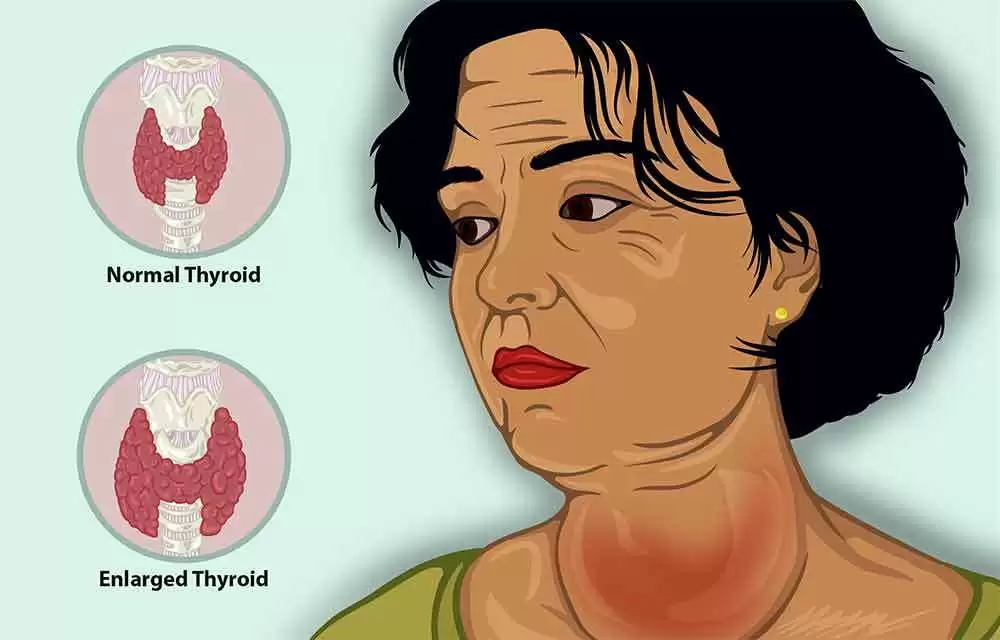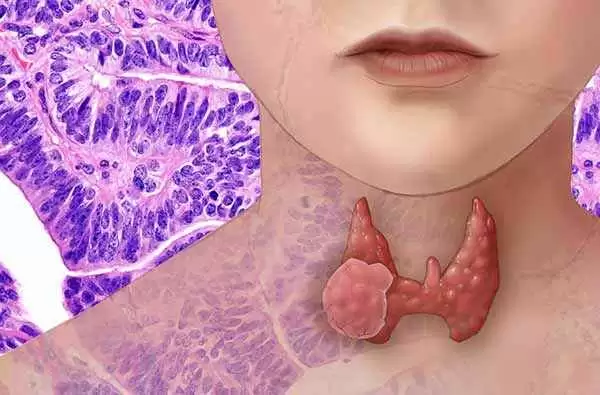
Celiac.com 04/25/2020 - Do you know or suspect that you may have a sensitivity to wheat (or gluten)?
According to the European Journal of Endocrinology, 43% of people with gluten sensitivity will manifest a form of thyroid dysfunction. (1)
Celiac.com Sponsor (A12):
The American Journal of Endocrinology reports 30.3% of people with celiac disease will have thyroid dysfunction. (2)
If you have a gluten sensitivity, a common manifestation is that it impacts your thyroid. In fact, thyroid dysfunction is four times higher in people with celiac disease than in the general population. (3)
Your thyroid is a butterfly shaped gland located in your neck. The two main hormones produced are triiodothyronine (T3) and thyroxine (T4). The most common types of thyroid dysfunction are related to the levels of hormones. For instance, hyperthyroidism is an overproduction, as seen in conditions such as Graves disease. Hypothyroidism is when you are not producing enough or your thyroid is underactive, as seen in conditions such as Hashimoto’s.
Hormones get into the cell through receptor sites specific to that particular hormone. Estrogen goes into an estrogen receptor site. Testosterone goes into the testosterone receptor site. Thyroid hormone will only go into a thyroid receptor site. There is a thyroid receptor site on every single cell of your body. It is an incredibly important hormone.
Have you ever turned the thermostat down in your home on a winter night when everyone goes to sleep to save fuel? And in the early morning, turn it up to warm your home before everyone wakes up? Your thyroid is the thermostat that controls the temperature inside every cell of your body, otherwise known as your metabolism. And your metabolism is how fast or slow every function in your body occurs.
Because the thyroid regulates the level of function of every cell in your body, any symptom in your body can be the result of thyroid dysfunction.
The most commonly recognized symptoms of thyroid dysfunction are:
- Cold hands and feet
- Lack of vital energy
- Brain lacks clarity of thought
- Difficulty losing weight
- Depression
- Hitting snooze multiple times in the am
Physical symptoms that may suggest a thyroid condition:
- Distal third of the eyebrows are thinned out
- Dry, cracked skin, such as the bottoms of your feet
- Brittle hair
- Fatigue
- Increased sensitivity to cold
- Constipation
- Dry skin
- Weight gain
- Puffy face
- Hoarseness
- Muscle weakness
- Elevated blood cholesterol level
- Muscle aches, tenderness and stiffness
- Pain, stiffness or swelling in your joints
- Heavier than normal or irregular menstrual periods
- Thinning hair
- Slowed heart rate
- Depression
- Impaired memory
- Enlarged thyroid gland (goiter)
Medication Warnings for People with Thyroid Dysfunction
Of course, if it is determined that you need medication, always follow your doctor’s advice. But at the same time, investigate. ‘WHY’ does my body need medication right now? The FDA warns that some thyroid medications may cause serious consequences, including liver disease, liver dysfunction and death. (4) Although uncommon, if you are taking medications and are not seeing improvement, discuss concerns with your doctor before stopping any medications. Try eliminating gluten from your diet to see if you notice any improvement with your thyroid-related symptoms.
People with a sensitivity to gluten who still eat wheat require 49% more thyroid hormone to ‘get the job done’ compared to when they stop eating gluten. (5) That means that IF gluten is a problem for you, when you stop being exposed to gluten, your thyroid begins working better, requires less ‘outside help’ - thus less medication, and less risk of side effects from the medication.
If you improve on a thyroid healing protocol, some people find antidepressants are no longer necessary. But before going off any medications, you should first check with your doctor on how to safely do this and confirm it is advisable.
Thyroid function is critical to your sense of well being. Whatever it takes to improve its function so you can feel good, keep digging away to discover what may help you. You may be among the many people who have a sensitivity to gluten, and it is triggering an autoantibody response. If so, eliminate gluten from your diet. If gluten is not your trigger, you will need to identify what the trigger(s) are. There is often more than one thing. For example, once BPA, a chemical used to mold plastic found in our food and drinks gets into our bloodstream, it is notorious for binding to thyroid and causing chaos. (6)
Removing substances (foods and chemicals) offensive to the thyroid,allows this very important gland to function more normally. Testing is advisable to drill down and uncover the source of the problem.
What can impact the thyroid negatively?
Chlorine is a common one that binds to the receptor sites. (7) An easy ‘base hit’ is to add a chlorine shower filter to your shower head. It may also improve your skin and hair.
Bromine - Overexposure to bromine can cause hypothyroidism. (8) Bromine can be found in baked goods, carbonated soft drinks, hot tubs, and even your car upholstery. Your thyroid relies on iodine for hormone production. Bromine tricks those receptor sites into thinking it is binding with iodine. Ultimately, this results in an iodine deficiency and likely thyroid dysfunction.
Fluoride - Some people benefit from choosing fluoride-free toothpaste or fluoride-free water. Fluoride effects appear to be more severe in people with iodine deficiencies and is more closely associated with hypothyroidism. (9)
Goitrogenic foods - Goitrogenic means they may inhibit thyroid function. The following are very good foods for you but it is worth seeing if any of them may be inhibiting thyroid function. This would include cruciferous vegetables like broccoli, cabbage, or cauliflower. If you have thyroid problems, screening these foods, keenly observing how you feel and function may be of value.
Gluten Sensitivity with or without celiac disease - A recent 2019 study of 34 women with thyroid disease was performed to examine the impact of a gluten-free diet. After six months, the results showed that the group on a gluten-free diet had significantly less antibodies affecting thyroid globulin (TG) and thyroid peroxidase (TPO). (10)
Rapid weight loss - When you lose a lot of weight or starve yourself, your thyroid slows down its metabolic activity. Ancestrally, this is your body’s way of protecting you for those times when food is scarce, to prevent death from starvation. When your gas gauge says empty and the nearest station is a few miles away, you slow down to burn less fuel and hopefully you’ll make it to the station for a fillup (your next meal). Responsible weight loss is slow and steady.
Estrogen - Yes, estrogen is needed for both men and women, but you can have too much of a good thing. Many studies have been done on the association between estrogen and your thyroid levels. Estrogen dominance produces thyroxine binding globulin (TBG) which binds to that thyroid receptor site, reducing your available thyroid hormone availability.
A Case of Mistaken Identity
The primary offensive gluten molecule is 33 amino acids long. It’s a long molecule. If your immune system is searching (antibodies) for the food you are sensitive to it may attack other molecules that look like the food. The surface of your thyroid is made up of proteins and fats. The proteins are made up of many amino acids, which can include a section that looks like the gluten molecule. Now the immune system may go after the thyroid damaging your thyroid cell. The ‘geek’ term for this is Molecular Mimicry.
Once the immune system goes after the thyroid damaging your thyroid cell because of Molecular Mimicry (in this example), now your body needs to make thyroid antibodies to get rid of that damaged cell. If you have a sensitivity to gluten, every time you eat gluten, your body creates antibodies to gluten. These may also go after the thyroid where it looks like it (if that is your genetic weak link). Eventually, over time, your body develops the mechanism where it starts making antibodies to the thyroid ongoing. Some celiac patients or people with gluten sensitivity find that when they go on a gluten-free diet, the thyroid antibodies also go down. Sometimes dramatically, full remission. Thus, sometimes you can reduce the antibodies to your thyroid just by removing the irritating foods.
Foods That Contain Gluten
Many foods contain gluten, but the concerning ones (to everyone) stem from wheat, rye, and barley. These are toxic forms of gluten that nobody is able to digest, and it is one of the most common foods people eat. In general, when referring to a gluten-free diet, this means avoidance of foods containing wheat, rye, and barley. Now there is gluten in many other grains, corn, rice, quinoa,... But it’s the toxic family of glutens in wheat, rye and barley we’re talking about here. You may be sensitive to corn. Or rice, or quinoa, or any other food. If you are, stop the food. But it would not be included in the family of gluten sensitivity. That term is allocated to wheat, rye and barley.
And remember these grains are used as fillers in many different foods as well as hidden sources, such as sauces, cosmetics and shampoos (which can be inhaled). You want to eliminate all forms of gluten to reap the benefits.
A recent study on women with Hashimoto’s showed that a gluten-free diet may offer clinical benefits. (11) And it isn’t just hypothyroidism that seems to show improvement. People with Graves are also reporting improvement. (12) Why? Gluten is a common trigger for a lot of people. You may be one of them and not even realize it.
If you are struggling to manage your thyroid symptoms, try a gluten-free diet for a few months. You should notice symptom improvement relatively quickly if gluten is the only trigger making your condition worse.
Scientific References
- Valentino, Rossella & Savastano, Silvia & Maglio, Maria & Paparo, Francesco & Ferrara, Francesco & Dorato, Maurizio & Lombardi, Gaetano & Troncone, Riccardo. (2002). Markers of potential coeliac disease in patients with Hashimoto's thyroiditis. European journal of endocrinology / European Federation of Endocrine Societies. 146. 479-83. 10.1530/eje.0.1460479.
- Sategna-Guidetti, C & Volta, U & Ciacci, Carolina & Usai, Paolo & Carlino, A & Franceschi, L & Camera, A & Pelli, A & Brossa, C. (2001). Prevalence of thyroid disorders in untreated adult celiac disease patients and effect of gluten withdrawal: An Italian multicenter study. The American journal of gastroenterology. 96. 751-7. 10.1111/j.1572-0241.2001.03617.x.
- Baharvand P, Hormozi M, Aaliehpour A. Comparison of thyroid disease prevalence in patients with celiac disease and controls. Gastroenterol Hepatol Bed Bench. 2020;13(1):44–49.
- fda.gov
- Virili, Camilla & Bassotti, Giulia & Santaguida, Maria & Iuorio, Raffaella & Duca, Susanna & Mercuri, Valeria & Picarelli, Antonio & Gargiulo, Patrizia & Gargano, Lucilla & Centanni, Marco. (2012). Atypical Celiac Disease as Cause of Increased Need for Thyroxine: A Systematic Study. The Journal of clinical endocrinology and metabolism. 97. E419-22. 10.1210/jc.2011-1851.
- Gore AC, Chappell VA, Fenton SE, et al. EDC-2: The Endocrine Society's Second Scientific Statement on Endocrine-Disrupting Chemicals. Endocr Rev. 2015;36(6):E1–E150. doi:10.1210/er.2015-1010
- Bercz JP, Jones LL, Harrington RM, Bawa R, Condie L. Mechanistic aspects of ingested chlorine dioxide on thyroid function: impact of oxidants on iodide metabolism. Environ Health Perspect. 1986;69:249–254. doi:10.1289/ehp.8669249
- Allain P, Berre S, Krari N, et al. Bromine and thyroid hormone activity. J Clin Pathol. 1993;46(5):456–458. doi:10.1136/jcp.46.5.456
- Malin, Ashley & Riddell, Julia & Mccague, Hugh & Till, Christine. (2018). Fluoride exposure and thyroid function among adults living in Canada: Effect modification by iodine status. Environment International. 121. 667-674. 10.1016/j.envint.2018.09.026.
- Krysiak, Robert & Szkróbka, Witold & Okopien, Boguslaw. (2018). The Effect of Gluten-Free Diet on Thyroid Autoimmunity in Drug-Naïve Women with Hashimoto’s Thyroiditis: A Pilot Study. Experimental and Clinical Endocrinology & Diabetes. 127. 10.1055/a-0653-7108.
- Gier, Dominika. (2019). EVALUATION OF THE PREVALENCE IgG-DEPENDENT FOOD INTOLERANCE IN WOMEN PATIENTS WITH THYROID DISORDERS.
- Joshi AS, Varthakavi PK, Bhagwat NM, Thiruvengadam NR. Graves' disease and coeliac disease: screening and treatment dilemmas. BMJ Case Rep. 2014;2014:bcr2013201386. Published 2014 Oct 23. doi:10.1136/bcr-2013-201386










Recommended Comments
Create an account or sign in to comment
You need to be a member in order to leave a comment
Create an account
Sign up for a new account in our community. It's easy!
Register a new accountSign in
Already have an account? Sign in here.
Sign In Now